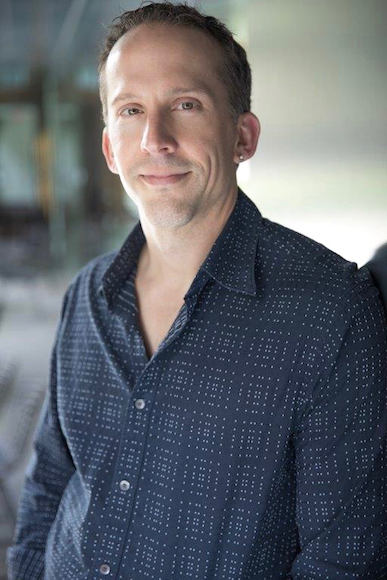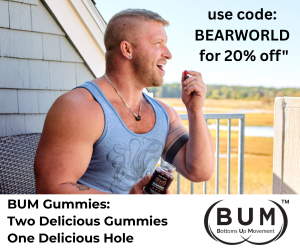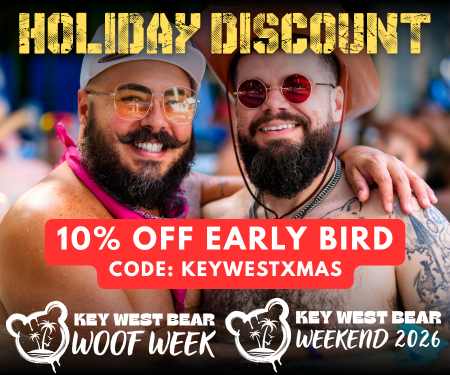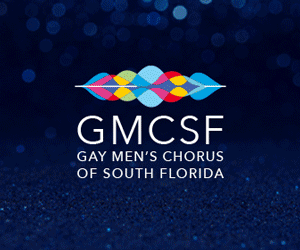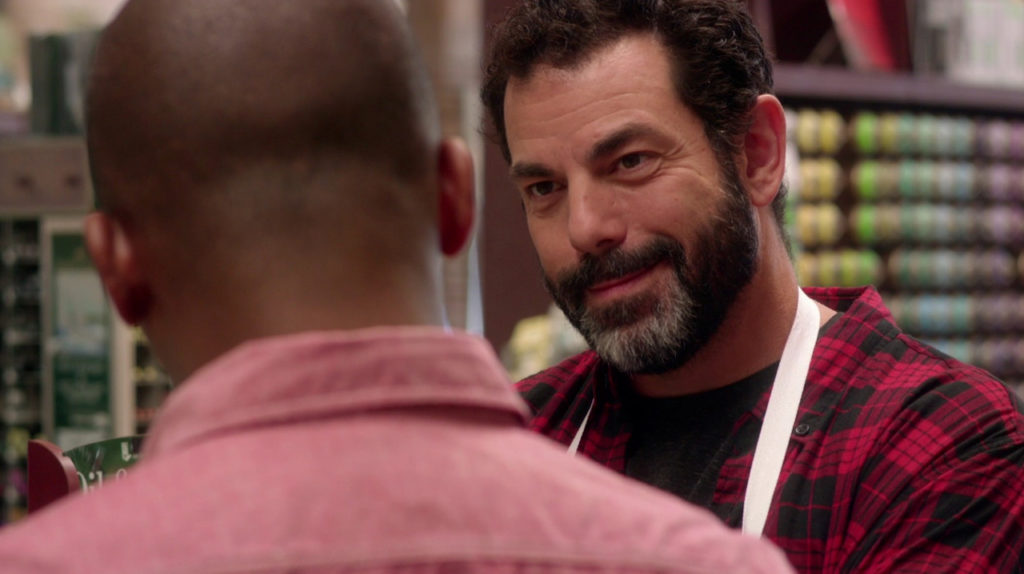
The New 30: Chat with WebSeries creator Walt Bost

Is aging still an issue in the gay community? There seems to be a diminishing focus on twinks vs daddies and age is just a number…or is it? Meet Walt Bost, filmmaker, as he answers the questions with his webseries, now raising money on Kickstarter in order to make Season 2!
His series The New 30 is a six-episode gay web series that explores the lives of Elliot and his closest friends in L.A. as they navigate getting older and all the unexpected challenges, surprises and heartache it brings. Equal parts Sex and the City, Soul Food, Looking and Thirtysomething, The New 30 is a delicious diverse cocktail of comedy, sex and drama. The show also features a very sexy bear.
Originally from North Carolina, Walt Bost has written, directed and edited the award-winning short films ‘Harbinger’ and ‘The Hike’ and also the feature film ‘Immortal’. As an Emmy-nominated supervising sound editor, Walt’s credits include ‘Veronica Mars’, ‘Private Practice’, ‘The Following’ and ‘Lady Dynamite’. He just wrapped CW’s ‘iZombie’, worked on Netflix’s ‘You’, and currently works on ‘Grace & Frankie’.
Watch Season 1: www.youtube.com/c/TheNew30
Be a part of Season 2 by pledging to their Kickstarter Campaign, live NOW!
I chatted with Walt about his series, producing, coming out and more!
What does “new 30” mean?
The show is about gay friends in their 40’s still trying to figure out their path in life. In the pilot, the main character Elliot turns 40 and is not really happy about it – he’s lost his job, doesn’t know what he’s doing anymore and his relationship recently ended. Trying to cheer him up, his friends tell him that “40 is the new 30!”
Did you come up with the concept from your personal life?
Absolutely. It had been a good while since I had written and directed anything, and I had been working on independent projects in various roles on the side. But nothing was really speaking to me, and I was feeling the need to do something that I was passionate about. At the same time, I found myself going through a lot of personal struggles with career and relationship issues and feeling like I was at a major crossroads. And I started wondering, how is it that I can be in my early 40’s and going through all this stuff? I thought everything would be worked out by now.
I had never seen anything on tv or online that represented what I was currently experiencing. I started thinking about my gay friends in their 40’s, what they’ve been through and are presently going through, and how they all lead very different lives from me and each other – and how all these types of stories are rarely seen on screen. I felt that most of the gay-themed media out there always seemed to be about guys in their teens or twenties, and consisted of the same gay subjects and themes. So I decided that the stories I knew of needed to be told, and done so in a professional manner – with diverse casting and universal themes.
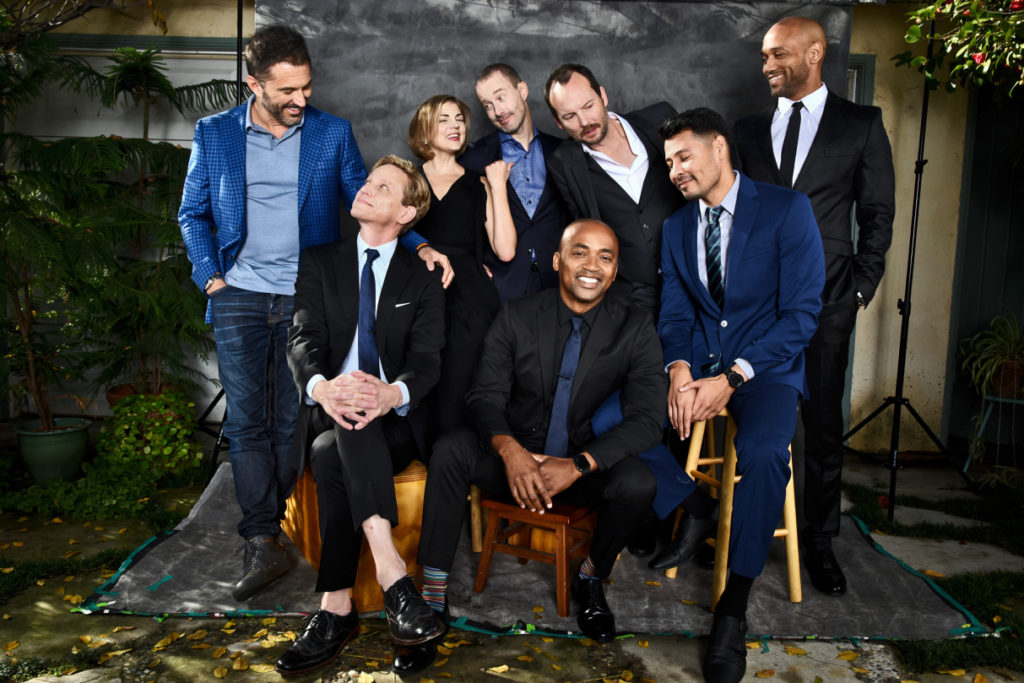
What was your creative process in writing the series?
I pitched the idea to my friend and fellow filmmaker John Sobrack to see if he’d write the project with me. He’s also gay, and a very talented writer, and I knew it would be great to have his voice involved in the show. So we met and he sparked to the idea and agreed to write the series with me. Next, we got together numerous times to flesh out the initial characters I had created. We decided on a six episode season, but to only write the pilot first and self-fund the production of it in order to see if it was going to work as a series or not. After we shot it and completed post production, we thought we had something pretty good and that it was going to work as a series. We then wrote the other 5 episodes of Season 1.
Did you plan for it to be a web series along?
It was always designed as a web series. That’s what it felt like to me – not a short, not a feature – but ongoing stories about these friends. I had looked online at gay series on YouTube and other places, and I thought there was definitely room for The New 30.

What are the biggest challenges when creating an independent film project?
The biggest challenge is money…somehow getting the funds to do your project. Then, you have to get talented people to work on it for that budget! Then, after you get it made, you need to get it seen in the sea of all the independent projects out there. Know that there will be roadblock after roadblock after roadblock from the start of your project. But if you really want to get it done, you will find a way.
What was the shooting experience like – from shooting schedule to craft services?
We shot for 8 days over a 10 day period (2 days off), and it was in the middle of the hot, hot L.A. summer – which was an enormous challenge in itself! We had 8 main characters, and numerous guest stars and smaller bits. It was tricky to make it all happen, because everyone had other jobs and auditions and family responsibilities… and they weren’t getting paid a lot. Luckily, we didn’t have too many different locations to deal with, and the crew was very invested into making the shoot successful. They all really believed in it, despite the low budget, and sometimes that can make all the difference.
The shoot was pretty smooth for the most part; everyone worked their tail off, but we all had so much fun doing it. We shot with a Blackmagic camera, which made things really efficient and fast, and on some days we shot with two cameras. We did have to change the location of the last episode at the last minute – it was supposed to be exterior, but it was going to be on the hottest days of the summer when we were supposed to shoot it! So, we scrambled to find an interior location, and for a few days we were really worried we weren’t going to find anything we could afford. We ended up compromising where we shot the episode, but it all worked out in the end. And yes, we made sure there was great catering and craft services available at all times. A well-fed cast and crew is a happy cast and crew!
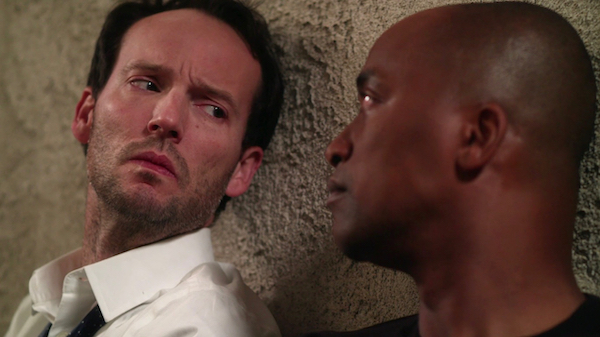
The cast is truly diverse. With diversity being such a hot button in Hollywood today, did you feel the need to mark a check list from African-American, to Asian, to bears, to twinks, to everyone in between?
I really didn’t have a so called “check-list.” However, one of the biggest issues I saw when looking at other series online was that mostly all of them were white. I had always intended for Elliot, the main character, to be black. That was a must for me – I wanted the lead to be a gay black man, because you rarely see that. Going into casting for the other roles, the ethnicity of the characters was entirely open. However, it was incredibly important to me and John that we have a diverse cast. That’s what real life is like! As far as “type” of character, we just wanted them to seem like real people. We wanted them all to be different and unique and as real as possible.
What is your take on gay and trans characters being portrayed only by gay and trans actors?
This is a controversial topic. I’ve always felt the best decision you can make in casting is simply choosing the best actor for the role. An actors’ job is to act – they are not actually the characters they are portraying, they are acting. For The New 30, it didn’t matter to us if the actor was gay, straight, bi, pansexual, transgender or whatever. We always wanted the best actor for the role. Period.
At the same time, we have a new character in Season 2 who is transgender. I’ve been talking to my casting director about it, and ultimately, we both want a transgender actor to have the opportunity to play this part. It’s a well-written, three dimensional love interest to one of our lead characters. The right transgender actor will bring invaluable authenticity and experience needed for such a nuanced role.
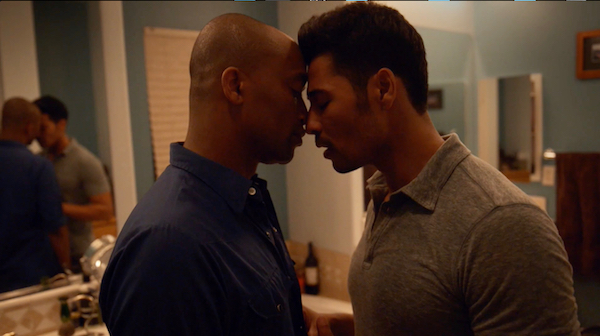
You raised money on Kickstarter to fund this project. What was that process like? Would you do it again?
Well, I AM doing it again! I didn’t think I would, but the reception for Season 1 has been so incredible that I am doing it again so we can make another season. We launch the Kickstarter for Season 2 on March 2! I pulled in a lot of favors from friends for the first one, and the scripts have bigger set pieces and more characters this time around, so we’re going to have to raise a lot more money this time. It’s going to be hard. We need people to help us by spreading the word on social media and to their families and friends!
What is your advice to someone creating their own web series?
Research and learn. Plan, plan, plan. Just because you have an iPhone and have some friends who are up for making a series doesn’t mean you should. Take it seriously. Make sure it’s about something you are passionate about. Write, write, and rewrite. Get a budget together so you can pay talented people for their time and talent. Plan for post production costs so you can make sure it’s the best web series you can make with your budget. Learn how to make a professional product.
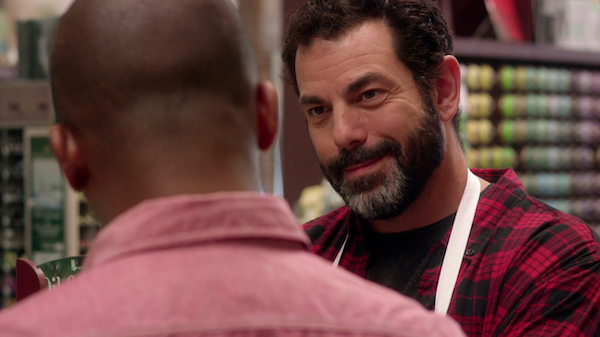
Do you see LGBT content becoming more mainstream as more larger scales films, from Love, Simon to Call Me By Your Name, take the spotlight?
Absolutely. LGBT content is getting way more mainstream and “popular”, even. This is evident with the latest films and especially with RuPaul’s Drag Race making the strides it has – more LGBT characters are being featured in movies. I’m so glad things are finally changing, with the big production companies willing to put more money into LGBT stories.
What was your own coming out story?
I never realized I was gay until college. In high school, I just didn’t fit in anywhere but I thought I liked girls. I didn’t have a girlfriend or sex until I was 18. When I went to college, I had two relationships with women and knew something was just not right but amazingly, didn’t get it. It wasn’t until a good friend came out to me, and then his friend seduced me, that I realized that I was gay. I came home one weekend (I’m from North Carolina) and came out to my mother, who then told me my sister had already spilled the beans. She was totally accepting and proud of me. I took my dad out to dinner that same weekend and told him. He was surprised, but said he and my stepmother didn’t care who I brought home as long as I was happy. So, I was really lucky to get those responses – especially having grown up in the South.
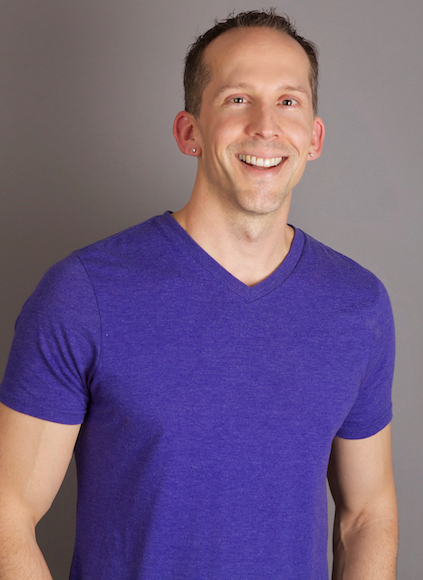
You work behind the scenes in Hollywood as an Emmy nominated supervising sound editor. What does that even mean?
Haha! You really want to know? Okay, you asked!
Yes, most people have no idea what I do. Say I’m working on a tv show… after an episode is picture edited and “locked”, the materials are “turned over” to me. First, I’ll go to a “spot” where the executive producers, editor and I will watch the episode, and they’ll tell me any sound specific notes they have for the episode. They’ll also give me an ADR list (automated dialogue replacement) of dialogue lines they think I need to re-record (ADR, or Loop) with the actor due to sound issues, which also might include new lines they’ve written that were not recorded on set.
After the spot, on my own I’ll go through all the recorded on-set dialogue tracks that are in the episode, and I’ll make notes for my dialogue editors of any problem areas I want them to pay special attention to when cleaning up the dialogue tracks. The dialogue editors will edit the dialogue tracks so all the clicks, pops and other bad sounds are eliminated, among other things. I’ll also professionally cue the ADR to be recorded with the actors from the temp ADR sheet they gave me in the spot, and I might add lines I think need to be re-recorded as well. I’ll also make sound effects notes when I go through the episode for my sound effects editors of special things I want them to make sure to include when they do their sound effects edit.
Then I’ll give all those notes to my dialogue and sound effects editors. Meanwhile, I’ll cue Group ADR for the episode. This is where any background “talking” should exist in the show, such as in a hospital or police station. On set, the extras do not talk – they just fake it.
After I cue the show for Group ADR, I’ll have a day where about 8 actors come in and I’ll direct them doing all the background “talking” for the scenes, or “walla” as it is called.
Next, I’ll cue foley for the episode – which consists of writing down time codes where the actors walk or make sounds with props, basically – and then that will be recorded live on a sound stage by foley artists.
After I’m done recording the Principal ADR with the actors and the Group ADR with the Group actors, then I have to edit it for the show – clean it up and put it in sync, basically.
After all of this work, all the edited material – Principal ADR, Group ADR, Dialogue, Sound Effects, Foley – is sent to a big mixing stage. Along with the music, provided by the music editor and from the composer, it is all mixed by 2 mixers for 2 days and supervised by me and the producer.
Ultimately, the episode’s mix is finished when it is approved by the executive producers.
I warned you!
So you get to see all the shows you work on before they even come out. Do you tell your close friends spoilers?
I do get to see them all, but no I don’t reveal anything! That’s super dangerous in this day and age with social media and gossip and I like my job too much, thanks!
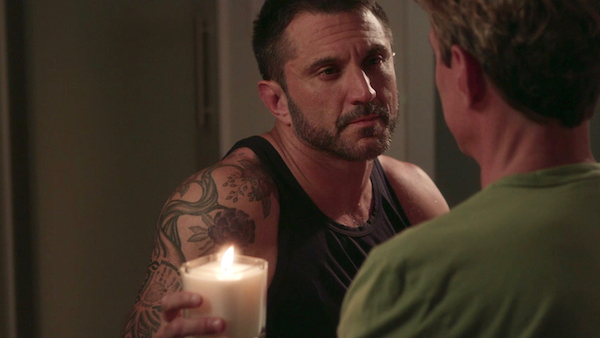
What is the future of The New 30?
We are about to launch the Kickstarter campaign (March 2) to raise funds to shoot Season 2! We need your support!
Go check out Season 1 on Youtube right now; and then help us make another season of a quality gay show about life and relationships in your 40’s!
Rapid Fire:
If you could go back and direct any classic film, which one would it be?
It’s not a “classic” film as in a really old well-revered film, but one film I wish my name was on was “Se7en.” I was working at a movie theater in North Carolina at the time, and we got to screen that on the Thursday night at midnight before the Friday it was released. It blew me away, and that night still resonates with me today. That’s my kind of movie all around.
What is your personal ritual after a long day of shooting?
I get on the elliptical bike to process the day and zen out.
Worst date?
After talking to a really hot guy for awhile, we met at a nice restaurant for a date and at the end he said he forgot his wallet. I paid and then we went to the movie we had planned to see – that he suggested – and paid for that too. I absolutely hated the movie and he loved it. Later, I saw he got into porn. True story.
Celebrity crush?
Charles Michael Davis (“The Originals”). I met him briefly recently and my crush got even worse because he was not only devastatingly handsome in person, but also extremely nice and down to earth. A wonderful actor. I’d kill to work with him. If you’re somehow reading this, Season 2, Charles? Let’s make it happen!
Biggest pet peeve when dealing with actors:
Not being prepared when they come to set. Everybody else in the cast and crew is busting their ass knowing their stuff, and it can ruin the day.
